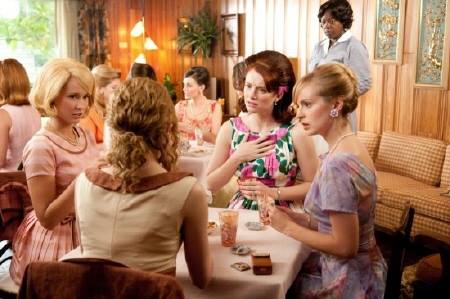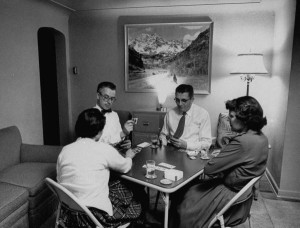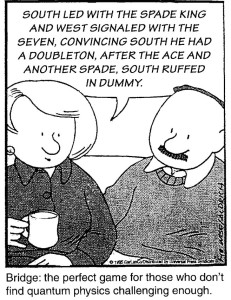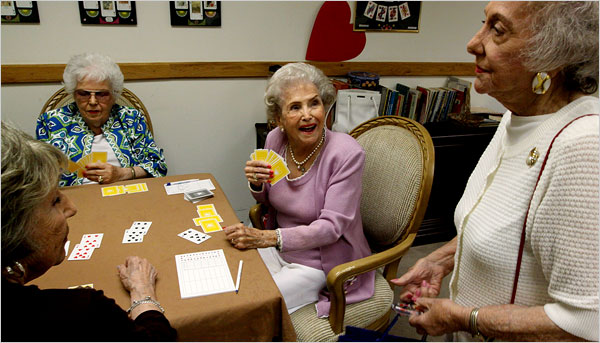 I grew up in the 1950s and ‘60s in Jackson, Mississippi, where I learned to play bridge in two arenas—around the swimming pool at the Colonial Country Club in the summers, and by watching my parents’ duplicate bridge club when they met at our house. I was allowed to watch if I didn’t talk, so I would silently walk around each table, pausing to watch each player bid and play their hands. This wasn’t the social setting of the women’s bridge club in The Help.
I grew up in the 1950s and ‘60s in Jackson, Mississippi, where I learned to play bridge in two arenas—around the swimming pool at the Colonial Country Club in the summers, and by watching my parents’ duplicate bridge club when they met at our house. I was allowed to watch if I didn’t talk, so I would silently walk around each table, pausing to watch each player bid and play their hands. This wasn’t the social setting of the women’s bridge club in The Help.
 It was a bridge club for couples, and everyone was serious about the game. There were usually three tables of four set up in our den. A virtual bridge tutorial.
It was a bridge club for couples, and everyone was serious about the game. There were usually three tables of four set up in our den. A virtual bridge tutorial.
My best friend, Jan, and I also learned bridge from her grandmother, Helen Van Hook, who was a Grand Master and played at tournaments all over the South. Helen’s husband, Benjamin Van Hook, taught math at Vanderbilt, was athletic director at Millsaps College and later taught math and was the golf coach at Southern Mississippi, but that’s another story. I guess my point is that these folks had brains that were firing on all cylinders. I always felt a bit intimidated in their presence when I was a kid. And I still feel that way as an adult when I’m around really smart people.
 So when a neighbor recently asked me if I would be interested in joining her bridge club, I was interested, but also a bit frightened. It has been over 30 years since my husband and I played—with his parents and mine—and then only occasionally. When we were young adults, we played Spades or Hearts with our friends—much easier games to play while socializing.
So when a neighbor recently asked me if I would be interested in joining her bridge club, I was interested, but also a bit frightened. It has been over 30 years since my husband and I played—with his parents and mine—and then only occasionally. When we were young adults, we played Spades or Hearts with our friends—much easier games to play while socializing.
The club has been playing on Friday afternoons, which won’t work for me, so I told her I’d play if they changed the day. While waiting to hear back from her, I’m frantically trying to brush up on the game. Online tutorials are helpful, (like this one from the math department at Cornell) but they also remind me how much I’ve forgotten! These women, like me, are in their sixties. But I fear they are much smarter than I am. Why would I put myself into such stress over something that’s supposed to be fun?
My friend assured me they’re not overly serious and will help me remember how to play. So I’m thinking it would be a good Alzheimer’s-fighting exercise, right? Studies, like the 90+ Study, done at a retirement community in California, show that certain mental activities help, but that the social component is also important, which is why playing bridge might be the perfect combination.

Since my work as a writer keeps me isolated (and often lonely) this would provide a regular (weekly) social and mental exercise. Stay tuned to find out whether or not they want me badly enough to change the club’s meeting day. Meanwhile, I’m trying to remember what a jump bid in notrump means….
Er, uh. Watch that “not overly serious,” always.